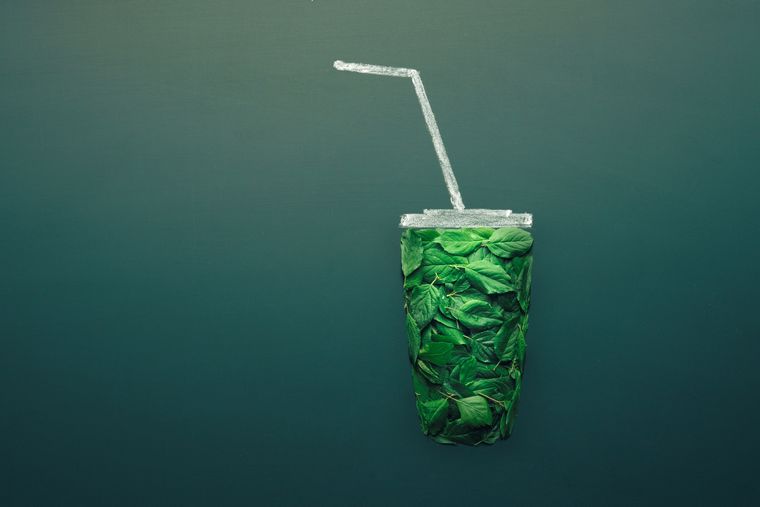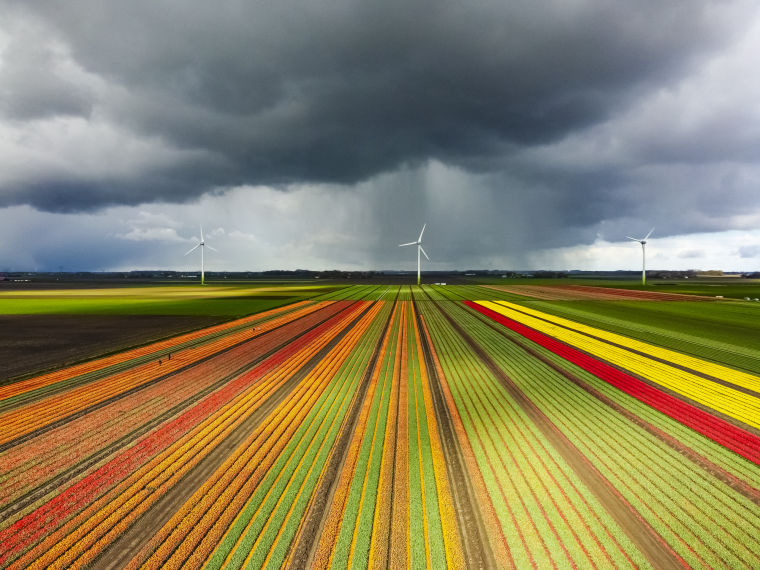From faux-gras to faux-mage…how plant-based brands are putting a twist on French food traditions
France’s food culture is steeped in tradition; it’s a food culture where change is slow, and beloved rituals, ingredients, and flavours are kept pristinely conserved over the ages.
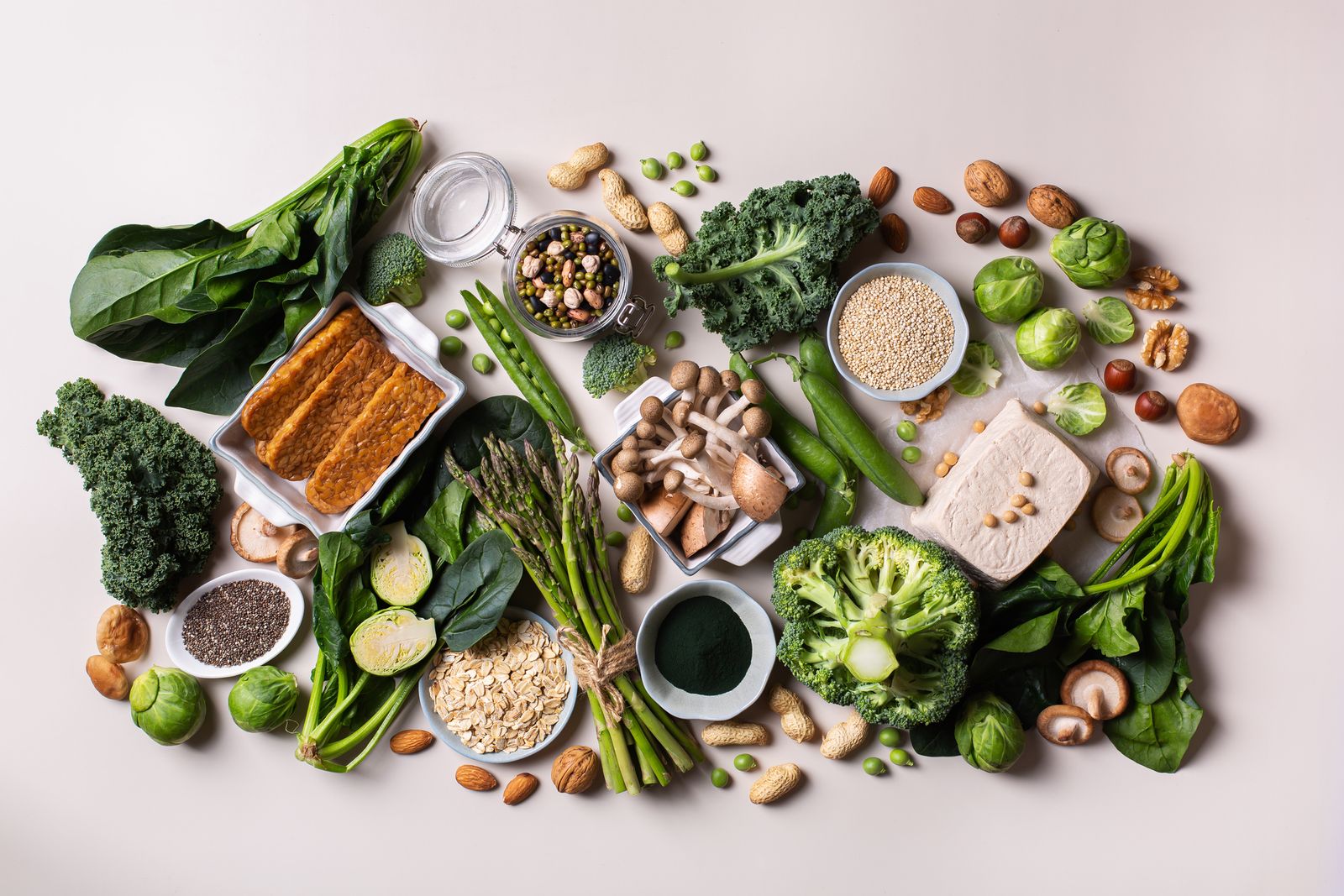
"Like wine, steak is, in France, a basic element, nationalized even more than socialized; it figures in all the settings of food life."
Roland Barthes, Mythologies
France’s food culture is steeped in tradition; it’s a food culture where change is slow, and beloved rituals, ingredients, and flavours are kept pristinely conserved over the ages.
In 2024, France came to a literal standstill as farmers waged protests over proposed EU reforms. Tractors blocked motorways in an ‘operation escargot’, manure and tyres were set ablaze at roundabouts, and road signs were turned upside down accompanied by the motto – ‘nous marchons sur la tête’ (signalling a world turned upside down by red-tape, policies and rules).
Despite the chaos, many French sided with the farmers’ concerns for food security (especially over produce being imported and being sold at lower costs than French produce) and President Macron swiftly gave in to the farmer’s demands, pledging higher subsidies, and suspending measures designed to reduce the use of pesticides. While agriculture accounts for just 1.6% of France’s GDP, farmers hold enormous social and political power in the country, and the annual Salon d’Agriculture in Paris is a celebrated occasion.
France is a country deeply rooted to the land. The word ‘terroir’ doesn’t just mean soil; it is a word that encompasses a deep emotional connection and pride in French produce, of understanding the origins of ingredients and showing respect for the cultivators behind the food we eat. It is a word steeped in romanticism towards the simplicity of rural life, and it is a word that brands often capitalise on in food packaging and branding – seen on anything from pâté to potato chips.
The holy trinity of French cuisine is often described as good cheese, good wine, and good meat. Beyond city centres, it can be challenging to find a vegetarian, let alone a vegan option featured on a restaurant’s ‘plat du jour’.
Until recently, plant-based options in mainstream supermarkets were slim pickings – often limited to a handful of dairy-free milks, and heavily processed soy burgers. They were products targeted to diets, rather than lifestyles, usually grouped in a ‘santé and végétal’ aisle alongside microwavable Weight Watchers meals, rather than integrated into the shelves of the majority. While other plant-based alternatives could be found in organic supermarket chains like BioCoop and La Vie Claire, they held considerably higher costs, and so were inaccessible to the mainstream.
There has been fierce resistance to plant-based brands using meat-mimicry words. In February 2024, the French government attempted to impose a decree banning the use of 21 ‘meat-related’ words, including sausage, steak, cordon bleu, escalope and ham for plant-based products. This followed pressure from the meat industry that the use of such words was ‘confusing’ for consumers.
But despite deeply entrenched cultural respect for meat and dairy, the landscape in France is starting to change. While plant-based in France is perhaps decades behind markets like the UK, between 2021-2023, it had a glow-up of 18% across 8 categories (including yoghurt, ready meals, and meat substitutes). Plant-based cheese especially exploded in France, doubling in volume between 2021 and 2023.
Let’s look at some of the pathways behind plant-based that are emerging in France, the cultural cues they tap into, and the best-in-show boutique and multinational brands that are putting their own French touch onto French food traditions.
HAPPY HUMOUR
What is it, and what cues can we look out for?
Bold bright plant-based brands that don’t shy away from references and visuals taken from the meat-industry, albeit in a subversive, playful, almost child-like way. Think cartoons of chunky pigs, clashing colour schemes, and explicitly naming products as ham and bacon. Products often focus on comfort or ‘guilty pleasures’ – e.g. bacon sandwiches, chicken-style nuggets - with plenty of references to ‘gourmandises’
On a wider level, this depicts a shift away from purity and diet culture. There’s a rejection of green/ organic colour schemes, and an emphasis that healthier eating isn’t incompatible with taste, excess, and indulgence. This is also a rejection of the serious tone that often characterises French product packaging, with gentle subversive messaging, tongue-in-cheek visuals and colloquial ‘from the streets’ French rather than the formal ‘vous’.
Brand Inspiration
La Vie range includes pea-protein bacon, ham, lardons, and BLT sandwiches. It’s recently branched into merchandise, features easy comfort recipes on its website and has collaborated with Burger King for their Veggie Steakhouse burger. The French brand has now made it across the pond to the UK, splashing to attention with provocative billboards that position their bacon as the great equalizer.
Their cardboard sleeve packaging also features a hidden surprise with a ‘cut-out-assemble-and-keep’ 3D paper pig - a creative, playful solution to packaging waste.
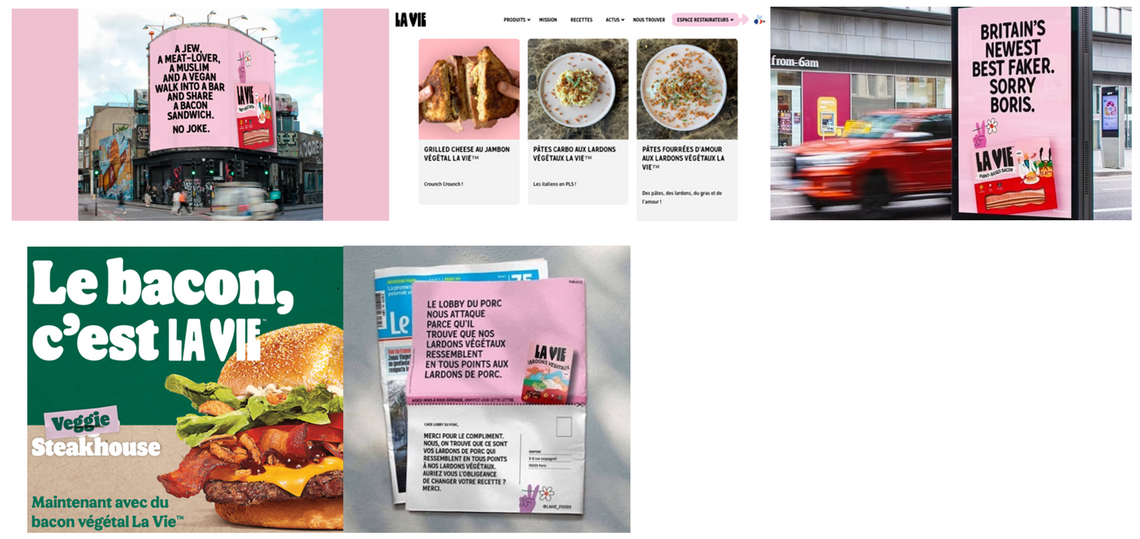 Translation – The pork lobby has attacked us because they find our lardons have too much resemblance to pork…Thank you for the compliment. We find your pork lardons are the ones that resemble our vegetable lardons. Does this mean you will change your recipe?
Translation – The pork lobby has attacked us because they find our lardons have too much resemblance to pork…Thank you for the compliment. We find your pork lardons are the ones that resemble our vegetable lardons. Does this mean you will change your recipe?
MIMICRY OF TRADITION
What is it, and what cues can we look out for?
This growing area is dominated by ‘faux-mage’ and ‘faux-gras’ – spaces that have traditionally been associated with gastronomy, mastery and savoir-faire in France. Familiar visual, taste, texture, and format sensations are retained – but with a twist; ingredients are subtly swapped for plant-based alternatives.
As a highly ritualised and rigid food culture, not tampering with tradition is important. Here traditions are not only kept intact, but plant-based alternatives can even elevate familiar food experiences, especially through artisanal claims and premium-inspired packaging – they fit into existing food rituals, rather than trying to reinvent the wheel.
Brand Inspiration
Faux-gras and terrine brands like Le Fou Gras by Le Grand Bluff and Gaia use visual and format cues that heavily communicate premium (small glass jars, small quantities, dark colour schemes, ingredients like truffle and wild mushrooms). Meanwhile, boutique faux-mage brands like Jay & Joy, and even Bel-owned brand Nurishh, offer twists on hero cheeses like camembert and goat cheese, complete with wooden packaging that mimic the real deal and hint at artisan skills.
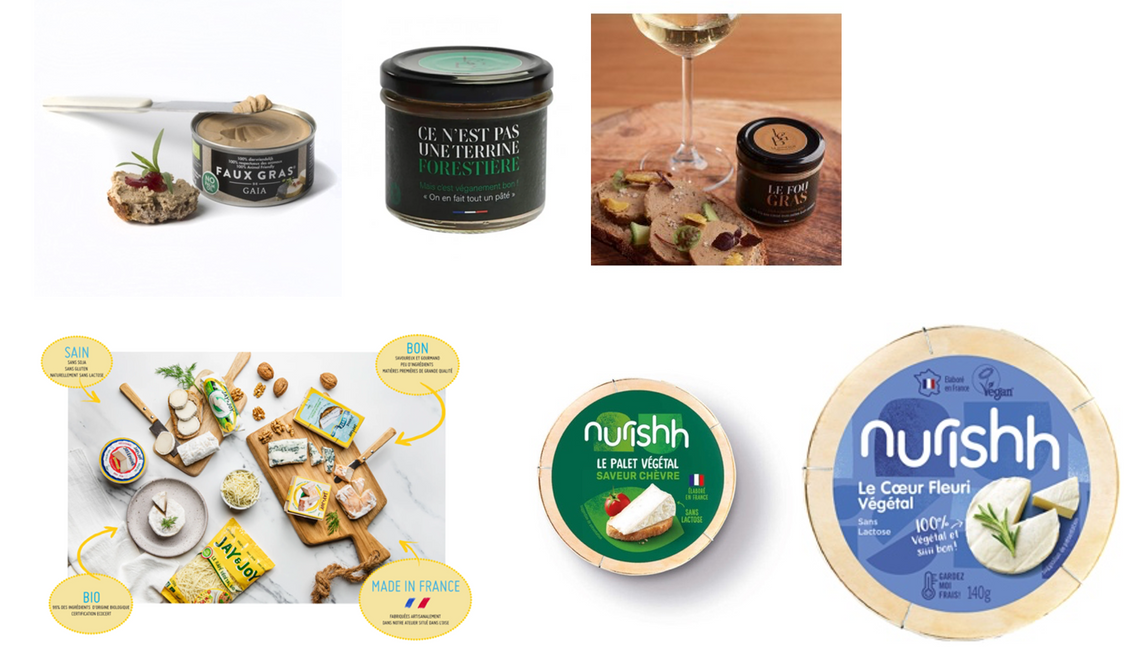
LONGEVITY FOR PEOPLE, FOR THE PLANET
What is it, and what cues can we look out for?
Purpose-driven messaging, with an emphasis that what’s healthy for you, is healthy for the planet. Here, packaging features raw ingredients, a high Nutriscore (usually grade A) reassures, and brands are often B-Corps. Transparency is key - local, ethical and transparent production chains are used to underlie strong ecological commitments.
However, explicit references to vegetarianism and veganism are rare - these brands are aimed at helping flexitarians discover new flavours and healthier alternatives to meat. Ease and accessibility is key, with products that look, taste, and feel like familiar meat-based products, and simple methods of preparation (e.g. microwave) show that plant-based choices don’t need to be difficult.
Brand inspiration
Happyvore is a pioneering start-up, founded in 2019, with an objective to offer better plant-based alternatives. Despite starting small, the brand is now available in all major French supermarkets. Ingredients feature non GMO pea, wheat, and soy proteins sourced from within France or within the EU, production is 100% French – the only brand of its kind. Previously known as ‘Les Nouveaux Fermiers”, it rebranded in 2020 to a name with more positive undertones (and of course, an English name opens up more opportunities for international success).

Hari&Co’s mission is to ‘democratise plant-based cuisine’ and initiate a diet revolution with healthier, more sustainable options. Products, such as plant-based ready meals, feature simple lists of ingredients (legumes like lentils, chickpeas, and red beans take centre stage) and all ingredients are sustainably farmed in France by close collaborations with local farmers, the ‘hari-culteurs’ (whose stories heavily feature on the brand’s website)


The French plant-based food market is experiencing a significant transformation, blending tradition with innovation. As we've seen, brands are adopting various strategies to appeal to French consumers, from playful and bold approaches to mimicking beloved classics and emphasising sustainability. These evolving trends reflect a broader shift in French food culture, where plant-based options are gradually finding their place alongside traditional fare.
The success of brands like La Vie, Le Fou Gras, Jay & Joy, Happyvore, and Hari&Co demonstrates that there is indeed a growing appetite for plant-based alternatives in France. These companies are not just offering substitutes; they're creating products that resonate with French culinary values and traditions while addressing modern concerns about health and sustainability.
As the plant-based sector continues to grow and innovate, it will be fascinating to see how it further integrates into France's rich (and often rigid) gastronomic landscape. While challenges remain, the increasing variety and quality of plant-based options suggest that this is more than just a passing trend. The success stories of brands that both subvert and integrate into the food framework represents a meaningful evolution in French food culture, one that respects tradition while embracing new possibilities for the future of food.
